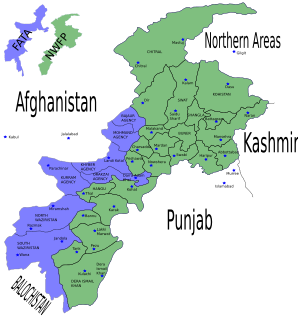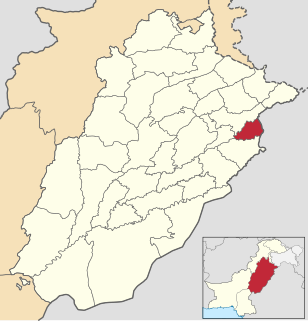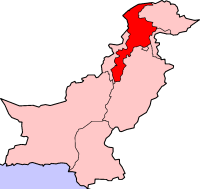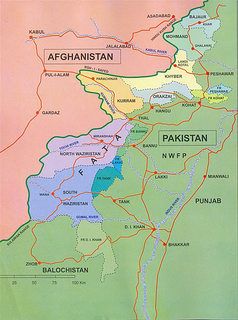| |||||
| Centuries: | |||||
|---|---|---|---|---|---|
| Decades: | |||||
| See also: | Other events of 2009 List of years in Pakistan | ||||
Events from the year 2009 in Pakistan.
| |||||
| Centuries: | |||||
|---|---|---|---|---|---|
| Decades: | |||||
| See also: | Other events of 2009 List of years in Pakistan | ||||
Events from the year 2009 in Pakistan.

The insurgency in Khyber Pakhtunkhwa, also known as the War in North-West Pakistan or Pakistan's war on terror, is an ongoing armed conflict involving Pakistan, and Islamist militant groups such as the Tehrik-i-Taliban Pakistan (TTP), Jundallah, Lashkar-e-Islam (LeI), TNSM, al-Qaeda, and their Central Asian allies such as the ISIL–Khorasan (ISIL), Islamic Movement of Uzbekistan, East Turkistan Movement, Emirate of Caucasus, and elements of organized crime. Formerly a war, it is now a low-level insurgency as of 2017.
Events from the year 2007 in Pakistan.
Events from the year 2008 in Pakistan.
Events from the year 2010 in Pakistan.

The September 2010 Lahore bombings were a series of three suicide bombings which occurred on 1 September 2010, in Lahore, Pakistan. Thirty-eight were killed and more than 250 were injured when a Shia procession was targeted.
Events in the year 2011 in the Islamic Republic of Pakistan.
On 25 December 2010, at least 47 people were killed and over 100 others injured, after a female suicide bomber detonated her explosives in a large crowd of people displaced by fighting, who were collecting food at a distribution centre of the World Food Programme in the Pakistani town of Khar, which is located within the Bajaur tribal region, of north-western Pakistan. It was later reported by witnesses, that the bomber dressed in a full-length burka had reportedly thrown a grenade after resisting search, to which then the bomber proceeded to detonate her explosives. Several police officials confirmed the bomber was a woman, as opposed to the more likely occurrence of a man wearing the burka as a disguise, in order to successfully conduct this suicide attack. It was also known that those in this crowd were predominantly displaced members of the Salarzai Tribe, which has supported Pakistan Army operations against the Pakistani Taliban within the Bajaur tribal regions. Those dozens of people injured in this suicide attack were apparently later taken to local hospitals via means of helicopters. Local Witnesses, including that of a government official at the main government hospital within the region, Dosti Rehman, claimed that he had personally counted some 40 bodies. However, there are concerns that the death toll could very likely rise, as the official stated that several of those injured, as a result of this suicide attack were apparently in a critical condition at the local hospitals. This particular bombing acts as one of a string of recent suicide attacks, which have occurred with near impunity, predominantly throughout Pakistan's north-western, Khyber Pakhtunkhwa Province, of north-western Pakistan. No particular militant group has of yet claimed responsibility for this suicide attack, although the Pakistani Taliban are strong suspects. The Bajaur tribal region has reportedly seen several Pakistan Army military operations in recent years, however such suicide attacks still continue throughout the region with near impunity. The Pakistani Prime Minister, Yousaf Raza Gillani later condemned this suicide attack, and claimed that such military offensives would continue against the Pakistani Taliban. This statement will be met with a certain degree of approval in the U.S., as Pakistan has recently been pressured to launch a major ground-offensive in the nearby North Waziristan tribal region, in order to root-out and destroy the last major remaining safe-haven for Radical Islamist and Pakistani Taliban insurgents within the country. The UN World Food Programme later suspended its food distribution activities in the Bajaur tribal region, as a security precaution to this suicide attack. This suicide bombing was strongly condemned by U.S. president, Barack Obama. The Pakistani Taliban later claimed responsibility for this suicide attack. This suicide bombing was officially declared the first such suicide attack to involve a female in Pakistan.
The Datta Khel airstrike was an American airstrike carried out on 17 March 2011 in Datta Khel, North Waziristan that killed 44 people and led to widespread condemnation in Pakistan. Sherabat Khan Wazir, a top commander of Hafiz Gul Bahadur's Taliban faction, was killed in the strike, and in response Bahadur threatened to end the peace deal struck with the Pakistani government almost four years earlier. The airstrike was part of a long series of drone attacks in Pakistan carried out by the CIA and United States military. It occurred just two days after diyya, a form of compensation paid to a victim's family under Islamic law, was paid for the release of U.S. CIA operative Raymond Allen Davis, signaling a resumption of U.S. activity after a several week hiatus while Davis' pardon on murder charges was being negotiated.

A double bombing occurred on 13 May 2011 in Shabqadar Fort in Charsadda District of Khyber Pakhtunkhwa province of Pakistan. 98 people were killed when two suicide bombs exploded in the Frontier Constabulary training centre. At least 140 others were injured. The explosions occurred while cadets were getting into buses for a ten-day leave after a training course.
The August 2011 Khyber Agency bombing occurred on 19 August 2011 in Jamrud, Ghundai within the Khyber Agency of FATA, Pakistan. At least 48 people were reported to have died after a suicide bomber exploded his vest at a mosque during Friday prayers in the month of Ramadan when about 300-500 people were praying; at least 40 others were also wounded.
In 2007, 34 terrorist attacks and clashes, including suicide attacks, killings, and assassinations, resulted in 134 casualties and 245 injuries, according to the PIPS security report. The report states that Pakistan faced 20 suicide attacks during 2007, which killed at least 111, besides injuring another 234 people. The PIPS report shows visible increase in suicide attacks after the siege of Lal Masjid.
These are the list of Terrorist attacks in Pakistan in 2010.
In 2008, Pakistan saw 40 terrorist attacks, which caused 154 fatalities and 256 injuries.
In 2009, Pakistan suffered 50 terrorist, insurgent and sectarian-related incidents that killed 180 people and injured 300.
Events in the year 2012 in Pakistan.

The 2012 Khyber Agency bombing occurred on 10 January 2012, when a bomb exploded near a petrol pump in the town of Jamrud near the Afghan border in Khyber Agency of the Federally Administered Tribal Areas (FATA) of Pakistan. The bombing killed at least 30 people while 78 others were injured.
This is a list of terrorist incidents in Pakistan in 2012. Pakistan has faced numerous attacks by insurgents as a result of the ongoing War in North-West Pakistan by the Pakistani military against militant groups, part of the War on Terror. At the same time, there have also been numerous drone attacks in Pakistan carried out by the United States which exclusively target members of militant groups along the Afghan border regions.
Events in the year 2014 in Pakistan.
On 13 February 2017, Jamaat-ul-Ahrar released a video announcing the launch of "Operation Ghazi", named after Abdul Rashid Ghazi who was killed in July 2007 inside the Lal Masjid. The operation started with the suicide bombing at the Mall, in which 12 civilians and six police officers were killed.
Operation Radd-ul-Fasaad is a codename of a combined military operation by the Pakistani military in support of local law enforcement agencies to disarm and eliminate the terrorist sleeper cells across all states of Pakistan, started on 22 February 2017. The operation is aimed to eliminate the threat of terrorism, and consolidating the gains of Operation Zarb-e-Azb which was launched in 2014 as a joint military offensive. It is further aimed at ensuring the security of Pakistan's borders. The operation is ongoing active participation from Pakistan Army, Pakistan Air Force, Pakistan Navy, Pakistan Police and other Warfare and Civil Armed Forces managed under the Government of Pakistan. More than 375,000 operations have been carried out against terrorists so far. This Operation has been mostly acknowledged after Operation Zarb e Azb.